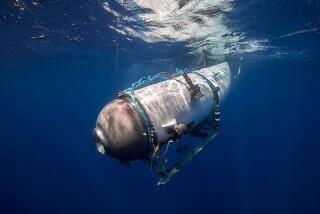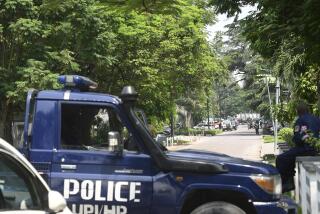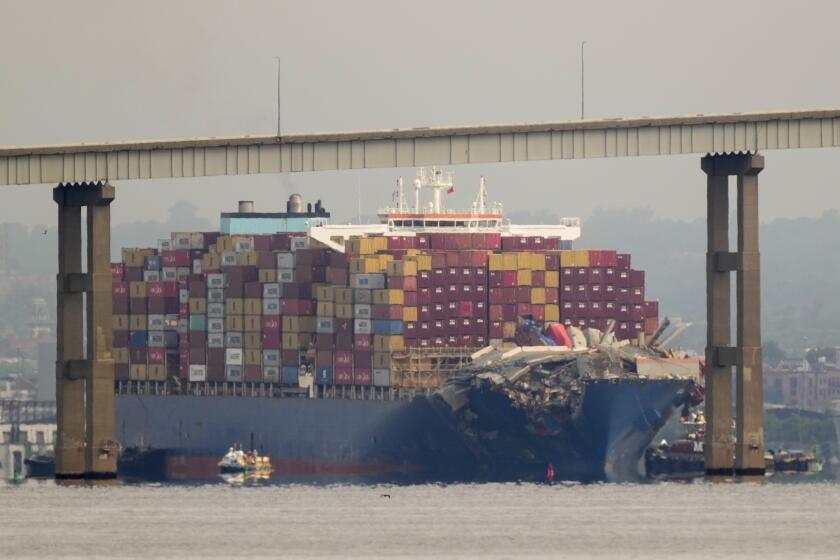U.S. Formally Restores Relations With Estonia : Diplomacy: ‘I felt as if I was touching history,’ the Baltic state’s foreign minister says after the signing.
The United States and Estonia on Wednesday formally restored the diplomatic relations between the two countries that had been interrupted since 1940, when the Soviet army, occupying this tiny Baltic country, forced the American diplomats here to leave.
“This is not a new country,” Curtis Kamman, deputy assistant secretary of state, said after signing a document resuming relations. “So what we are doing is establishing relations for the first time in 50 years with a freely elected government in Estonia.
“We are able to do that because Estonia now has its independence and control over its own affairs, and it didn’t have it for 50 years,” he said. “That is unusual and that is the historical significance of what we are doing.”
Kamman and Lennart Meri, the Estonian foreign minister, signed documents restoring diplomatic ties during a ceremony, conducted entirely in English, at Toompea, a pink palace attached to an ancient stone fortress, where Estonia’s Parliament meets and its government has offices.
“At first it seemed like a normal workday, but two minutes after I signed it, I felt as if I was touching history,” an obviously moved Meri told Kamman after the ceremony in his office.
The signing followed an announcement by President Bush on Monday that relations between the United States and the Baltic republics would be restored “immediately.” The two sides agreed to open embassies in each other’s capitals and to exchange diplomats in the “nearest future.”
“The United States is a major power--the only superpower left in the world,” said Juri Luik, chief of the political department of the Estonian Foreign Ministry. “Being recognized by the United States and establishing relations are very important for Estonia for economic reasons, but also because this will protect us from violence that could be directed against us by the Soviet Union or some groups in the Soviet Union.”
About 40 foreign countries have officially recognized the statehood of Estonia and its Baltic neighbors, Latvia and Lithuania; many others have indicated their intention to do so. But the Soviet Union has not officially recognized the independence of the three states that to Moscow remain “Soviet republics.”
“The Soviet ambassador to the United Nations has said that the Soviet delegation would not oppose the membership of the Baltic states, and this indicates that the Soviet Union has already made a political decision,” Luik said. “But some armed groups, like KGB paratroopers, could take our fate into their hands. This is always a threat. And that is why we are very cautious still and not yet very happy.”
Estonian government officials believe that 50,000 or so Soviet troops are stationed in their republic and about 250,000 more are based in their two Baltic neighbors. That the Soviet Union has not yet recognized the independence of the Baltics cast a pall over the ceremony for both sides.
“We’re obviously conscious that there is an important neighbor of Estonia, Latvia and Lithuania (that has not recognized their independence), and we are obviously quite interested to see what decisions are made by people in Moscow,” Kamman said. “But it is not something that is in any way affecting what I am doing on this visit.”
The United States had diplomatic relations with Estonia during its short period of independence between World War I and 1940. The United States never accepted the Soviet Union’s forcible annexation of the Baltic states under a secret protocol of a 1939 agreement with Nazi Germany. There had been no official contacts between the United States and the government of Soviet Estonia since.
Kamman said the United States is now considering ways to help the Baltic countries make the difficult break from the centralized Soviet economy. “We will be talking to the Estonians about how we can support their very difficult transition process to a free-market economy and to full economic independence,” he said, adding that the United States considers U.N. membership for the Baltics to be “well deserved.”
During his daylong stay in Tallinn, Kamman also handed a letter from Bush to Estonian President Arnold Ruutel as “a personal expression of our happiness at having diplomatic relations.”
Kamman plans to meet with officials in Latvia today and in Lithuania on Friday to establish diplomatic relations with those countries.
More to Read
Start your day right
Sign up for Essential California for news, features and recommendations from the L.A. Times and beyond in your inbox six days a week.
You may occasionally receive promotional content from the Los Angeles Times.






